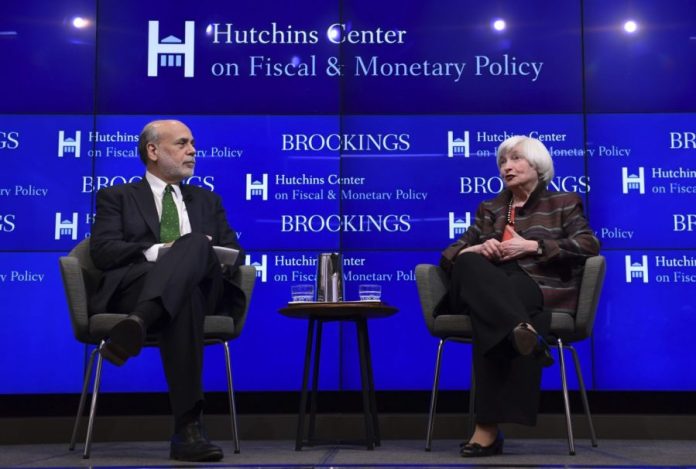
Former Federal Reserve Chairs Ben Bernanke and Janet Yellen condemned President Trump’s pressure campaign against its current chief, Jerome Powell, warning it could permanently damage the U.S. economy.
In a Monday op-ed in The New York Times, the former Fed leaders urged Trump to respect the independence of the central bank and choose a replacement for Powell who would do the same.
“President Trump, like all Americans, is entitled to express his views on monetary policy. He will have a chance to put his stamp on the Federal Reserve by nominating someone to succeed Mr. Powell when his term ends next spring,” Bernanke and Yellen wrote.
“In the interest of the U.S. economy, we urge that he select an individual who will keep an appropriate distance between the Fed and short-term politics, someone who is committed to preserving the Fed’s independence in monetary policy decision making.”
Powell has less than a year left in his second term as Fed chair, which is set to end in May, and Trump has been eager to show him the door. While the president has waffled on whether to fire Powell — which would be a legally dubious and financially risky move — Trump is almost certain to nominate a replacement who will be loyal to his agenda.
Trump has berated Powell for months for refusing to slash interest rates — something the Fed chair cannot do unilaterally — as the U.S. government faces steep borrowing costs on the soaring national debt. The president has urged the Fed to cut rates by amounts only seen during economic crises, even with unemployment close to record lows.
While some Fed officials have expressed support for mild rate cuts, not a single member of the central bank supports cutting rates to the levels Trump has suggested. Few, if any economists outside the administration have supported Trump’s call for stimulative interest rates as well.
Bernanke and Yellen said that regardless of Trump’s support for “a radical reduction in interest rates,” he must allow the Fed to make its own decisions based on data, not political pressure, or risk serious consequences.
The former Fed chairs pointed specifically to previous instances in which the Fed and other central banks adjusted interest rates to help fiscal authorities manage the national debt, which allowed inflation to spiral out of control.
“If investors and the public see that monetary policy is being used to facilitate government borrowing, they lose confidence that inflation will stay low. As a result, regular savers and investors in U.S. debt demand higher interest rates to compensate for the likely erosion of their capital,” they wrote.
“Ironically, forcing monetary policy to help finance deficits actually drives up borrowing costs for everyone, including home buyers and businesses, as well as the government.”

